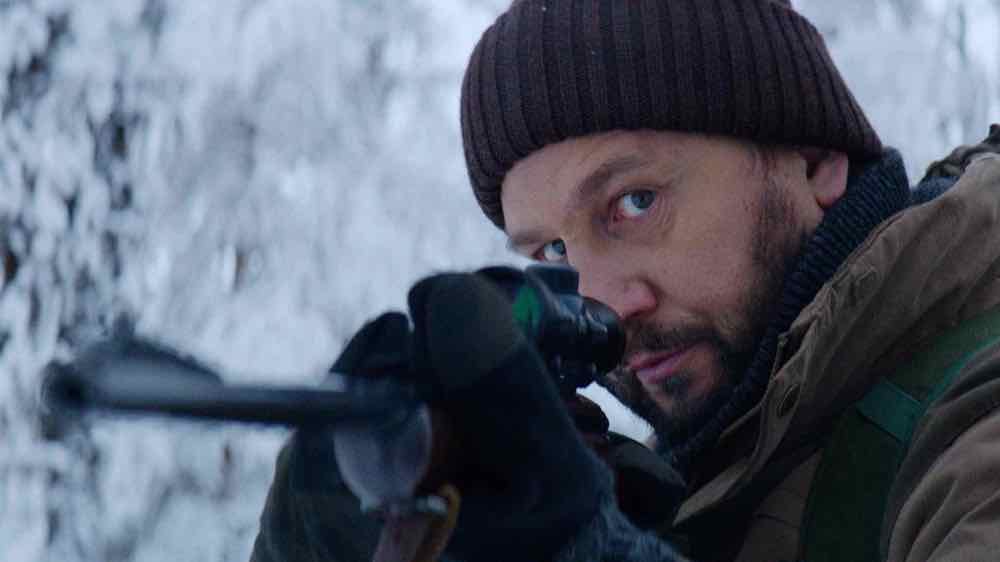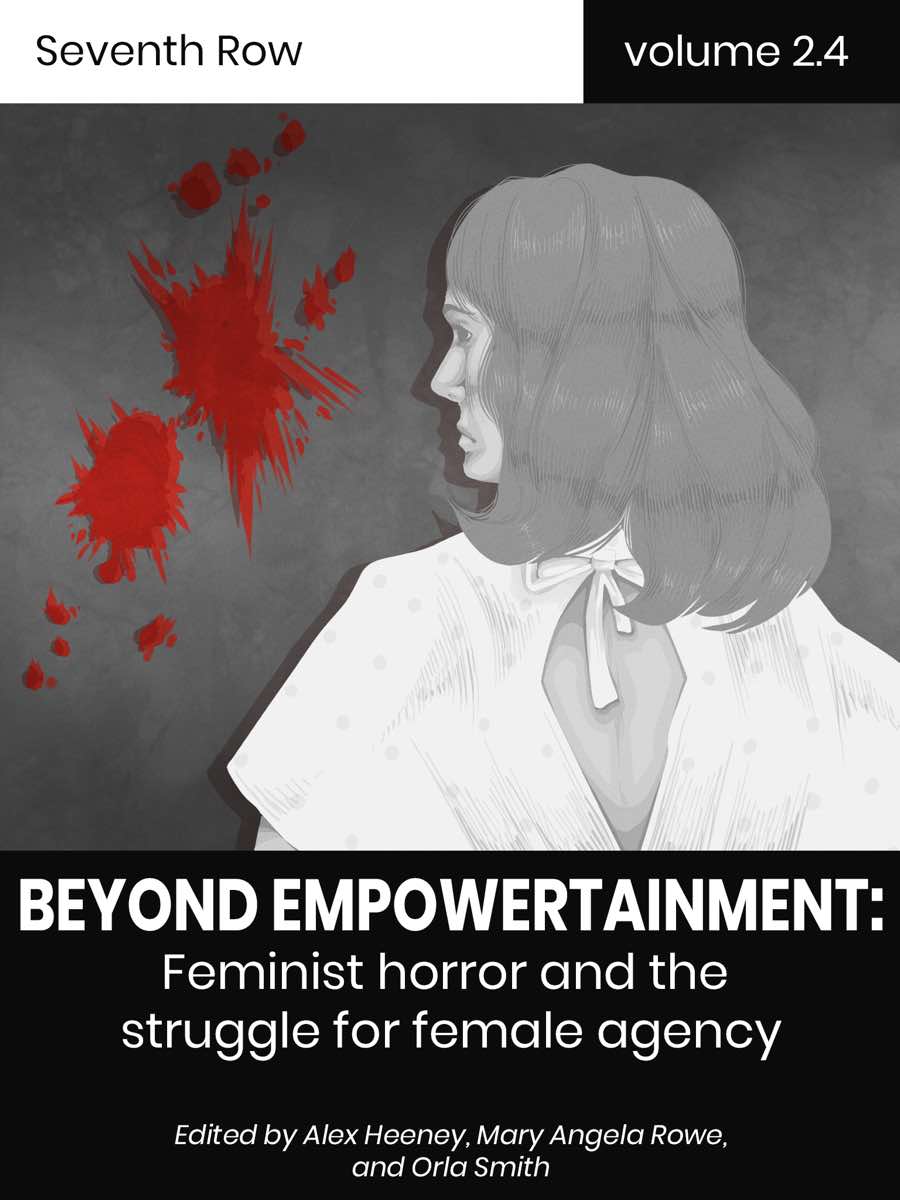In this interview, co-writer Eskil Vogt discusses approaching genre cinema for the first time in Thelma, depicting characters’ interiority on screen, and his collaboration with director Joachim Trier.
This is an excerpt of the interview which appears in our case study on Thelma in the ebook Beyond Empowertainment: Feminist Horror and The Struggle for Female Agency, which is available for purchase here.

Discover one film you didn’t know you needed:
Not in the zeitgeist. Not pushed by streamers.
But still easy to find — and worth sitting with.
And a guide to help you do just that.
Thelma is the fourth film by Norwegian auteur Joachim Trier and his first foray into genre cinema. It’s the story of a religious young woman entering adulthood who manifests strange powers after falling in love with a female classmate. Trier has also re-teamed with cinematographer Jakob Ihre and editor Olivier Bugge Coutté — all of whom have worked on all of Trier’s features. This is an excerpt of our interview with Trier’s longtime screenwriting partner, Eskil Vogt, who has co-written all of Trier’s films with him. The full interview is featured in the ebook Beyond empowertainment: Feminist horror and the struggle for female agency, which is available here.
Eskil Vogt on not trying to make the “Norwegian Carrie” with Thelma
Seventh Row (7R): Thelma seems to owe a lot to Carrie. Oslo, August 31st was a retelling of Le Feu Follet. How do you think about writing these films as retellings or adaptations?
Eskil Vogt: We had a long time ago seen and loved the Louis Malle film [Le Feu Follet] and then discovered that there was so much else in that book that felt very contemporary and different from Louis Malle’s film. That was something Joachim and I talked about regularly. The structure of that book was a perfect tool for that kind of story where we wanted to film Oslo today. It became a very free adaptation.
When it comes to Thelma, it was never like, “Now we’re going to make a Norwegian Carrie“. It wasn’t the idea at all. But we were very inspired, in the beginning, by both Brian De Palma and Stephen King. When we started to make the story about this girl who had these seizures, understanding it was a story about repression, it kind of worked itself into the story that she came from a religious family.
Spotting Carrie connections after the basic plot was set
Then we suddenly thought this might make people think of Carrie. But we already had a lot of story, a lot of characters. Then we said, well Carrie is such a good film. Let’s just see where this leads us. We didn’t re-watch Carrie to discuss where we positioned ourselves. We felt that the style of Brian De Palma in that movie is such a wildly different temperature and style that it wouldn’t bother people who knew Carrie.
In Europe, people tend not to mention Carrie. They have other references. In the States and North America, it seems like Carrie is still this huge, important milestone in genre picture that it is. But in Europe, it’s not that acknowledged as a classic. It’s not on people’s minds. It’s great that it’s still on people’s minds in America. It deserves to be.
Eskil Vogt on how the genre film Thelma is actually quite similar to his previous ‘realist’ films
7R: Is there a difference between how you thought about the imagery in Thelma, where it’s so important to creating that genre feel, compared your other films together which are more realist dramas?
Eskil Vogt: Now that we’ve made the genre film with the more flashy style, it’s easy to say that the movies before were kind of naturalist and realist, and this is completely different. But actually, it’s not. In the other movies, we perhaps started more with the characters and a very real situation. With the exception of Louder Than Bombs, they’re filmed in our environment, in Oslo, based on people we know and situations we’ve imagined or heard about taking place. Even Louder than Bombs, it’s about the kind of people we know very well, in a very intimate way.
We start with that realism, but we’re not happy with movies just being naturalist or realist. There has to be something more cinematic. It has to play with or explore cinema form. In all those films, there’s scenes or sequences or style that tries to elevate the naturalism, and moments that are very either stylized or very removed from the action or voiceover sequences, or a way to intercut things that also give a kick cinematically. They’re not just these existential, minimalist stories.
With Thelma, we tried to make that easier for us, by starting in the other end with the visual stuff. But obviously, anyone who makes movies or any art knows that styles and themes are not two separate things, that you put the style on top of the other. I don’t see Thelma as radically different than the other movies we’ve made. But the writing process was quite different.
Eskil Vogt on why making a genre film was necessary for Thelma
7R: What made you want to explore these themes from the genre perspective?
Eskil Vogt: Joachim and I, we’re huge film fans. We watch every kind of movie. We have become pigeon-holed as making one kind of movie. Or, at least in Joachim’s case, everyone wants him to remake Oslo, August 31st again and again because they love that one so much. He can’t do that. That would be death for him as a creative person.
Every time we make something, we try to see what would we like to see as film lovers. We felt maybe we should try to explore some of the other parts of our cinema addiction.
Thelma became less and less of a horror film as we kept writing. In a horror film, or supernatural movie, you have so much more freedom to stylize and make iconic images, which is always something that has interested us. We wanted to make those kinds of images happen in our other films, as well. But it’s very hard to do that without killing the naturalist, realist feel that those other stories needed.
On finally getting to make a genre film
Here, we felt we can just revel in that and just have fun with that. I think that’s a major part of why we started doing this. We knew that some people wouldn’t like us to explore that kind of [horror] movie. There’s an in-built fan base for that kind of films, but there’s also people who hate them and feel that they’re a bit culturally unacceptable still, which we never felt. We just felt that was right. We’ll do that and see where that leads us.
Science vs religion in Thelma
7R: How did you think about the interaction between science and religion in the film? The father’s misuse of scientific knowledge almost becomes a means of abuse.
Eskil Vogt: The contrast is very big. The fact that she’s studying biology and from that Christian family, it gives people these big perspectives. The father is from a religious environment where people are creationists. But he knows science. He’s a doctor.
These are very Norwegian tactics: that you should never feel better than anyone else. In religion, you have that, as well: you shouldn’t be arrogant. You shouldn’t look down on other people. Just because you know that the world can’t possibly be 6000 years old, you shouldn’t look down on those people.
That’s how he controls her even though she has this knowledge. She shouldn’t raise her head too high or have too high esteem of herself. I think that’s the abuse, the way he controls her. He also has enough knowledge to know that science can’t explain everything. That’s the beauty of science, as well. There’s so many enigmas and impossibilities in science that make people continue to look and to search and to be full of wonder.
Eskil Vogt on the abusive father-daughter relationship in Thelma
7R: It’s interesting what you’re saying about how he’s controlling her. He really seems to have his tentacles into her. He’s constantly interrupting her life and keeping tabs on her.
Eskil Vogt: He imposes himself, but in a very passive aggressive way. They call, and they ask questions. But he doesn’t yell at her. He isn’t physical with her in the way you might expect. He’s more subtle.
I think his control is based on love. That’s the kind of authority that it’s very, very hard to get away from. If you only have a patriarch who lays down the law and doesn’t show any affection, at one point, that snaps. He doesn’t have any hold on you.
But if you also become kind of addicted to your parents’ or your father’s affections, that they keep giving you love and nurture your self-esteem, that makes it even harder to get away from it. He has that kind of control over her that you quickly or slowly understand is unhealthy for her and too much. When you get the backstory, I hope, that turns on its head. You understand a bit more why he needs to have a certain control over her. In the context of the story, she can be dangerous.
Eskil Vogt on the prologue in Thelma
7R: There’s a sort of prologue where we see her father contemplating shooting her as a child, and then after the title card, we jump ahead to Thelma starting university. That sort of prologue structure seems to be common in a lot of writing that you’ve done with Joachim. How do you conceive of those prologues? What interests you in structuring it that way?
Eskil Vogt: Oslo, Reprise, and my film, Blind, open with some sort of montage of images, like an overture that’s more about the themes and the feel of the film than about just plot structure. A movie’s opening is one of the few places where you can do that. When plot starts to unfold, it’s very hard to get that kind of space.
We never talked about it that way, but Hiroshima Mon Amour opens with that beautiful sequence of “You have never seen anything in Hiroshima”. It’s such a great way to open a movie where you have all these perspectives and themes.
Story-wise, [in Thelma] you tell the audience that it’s a high stakes movie. If you just start with her at university, you open it more like a drama. Here, we buy ourselves time with the character. You have the music, those visual images, those high stakes things with the pointing of the gun at the little girl. Then people know that something dramatic will happen in this movie. Then we can build slowly, get to know the character as an adult after that.

The parents’ impossible choices
7R: The script seems to put Thelma’s parents in an impossible situation. You know their actions are clearly wrong, but they love their daughter. They’re afraid for her. How did you think about these impossible choices that they face?
Eskil Vogt: The idea was that it is a quite impossible choice, and the bad things the father does to Thelma does afterward is based on the fact that he wants to keep her alive. He doesn’t shoot her in the beginning.
This is the first time Joachim and I wrote a movie that’s kind of plot-based. This was one of the important things in the plot: with that flashback and the backstory reveal, we have to put ourselves in the position of the parents, of the father, and what could he have done? I think he could have done something better. He shouldn’t have kept Thelma’s powers from her and just pretended that they weren’t there and hoped they would never come back. He should have given her a chance to acknowledge them and take control of them, and then maybe function knowing who she really is. But he doesn’t do that.
But I feel that the genre element, for me, corresponds a little to how I feel as a father. You want to protect your child. At one point, you have to let go of that control. But at what point? And how terrible it would be for me to see my children live their life, and as a result, other people get hurt because it’s impossible to live and impose your will on the world, and take your place in the world without someone, at some point, getting hurt. That’s where I feel I have a certain understanding of the father.
Depicting interiority and subjectivity
7R: Joachim has talked a lot about how he wants to make films more novel-like in their ability to depict interiority and subjectivity. Since the script is the one written part of the process, how has that impacted your partnership?
Eskil Vogt: That’s an ambition that we both share. What we really enjoy in novels is the freedom of a novel, the way that you can change perspective or jump around in time, be part of the interior monologue of someone and then suddenly change to a more objective point of view. It’s very hard to digress in films.
Reprise is full of digressions. We tried to make them feel more like digressions while they actually informed the plot, to keep that feeling alive of freedom of storytelling.
With Thelma, we said to ourselves, “This time, we should try to keep more of a focus on the present, in the movie, and let things unfold in a chronological manner, except in the few flashbacks.” Just, deny ourselves some of the things that we had a lot of fun with in our other films. There’s no voice-over montages in Thelma. The times that we jump around and intercut it has to do with her powers. It’s a completely different way of doing that.
On filming characters thinking
The ambition of filming the interiority of characters is one of our main preoccupations. People always say that characters in cinema, it’s action. It’s not what they think; it’s what they do. They’re defined by their actions, and they have to be in conflict all the time. [But] we’re so interested in passive, thoughtful characters. So we’re kind of forcing ourselves to find means to make them interesting on screen.
I personally feel that cinema is one of the best mediums to show how people think because you can show thoughts very easily in cinema, and it’s a little bit more subtle sometimes than in writing because in writing, you have to put it into words exactly what they’re thinking. But when you edit and you intercut between someone’s face and what they’re seeing or their memories, you understand. You’re thinking with the character, but there’s like no commentary on exactly what’s being felt or thought.
Eskil Vogt on his first feature as a director, Blind
7R: Your film Blind almost takes that to an extreme. It’s pretty much all in her head.
Eskil Vogt: Yeah, that’s a way of looking at the film Thelma that I share with you. It’s one of the main themes that you can find in a lot of our movies, and Blind is a very good example of that, you can find that especially with Conrad in Louder Than Bombs. If you perceive someone from the outside, you have a certain idea of them. But if you’re allowed to follow the thoughts for a moment, you’ll never see them the same way again. There’s such a huge difference between how we appear and how we feel and how we think.
On collaborating with Joachim Trier
7R: You also make movies as a director and as a solo writer, but you’ve continued to collaborate with Joachim to co-write all of his films. What do you get out of that collaboration?
Eskil Vogt: Joachim and I, we go back a long way. We were nineteen, and we both wanted to make films. We started working together on short films, just helping out. I ended up being co-writer on script and first assistant on his first short. Then we both went to film school as directors, but we just kept working together.
We’re so close and have been working together so long. He’s my best friend. We talk about everything. I don’t feel excluded from anything when he makes a movie.
We talk during the shoot. He calls me at night saying, “This is hard and doesn’t work.” And I say comforting stuff. I used him like that when I shot my film. You can’t really help so you always say that, and it works out. He wants to hear my opinion during the casting.
The edit is the last draft of the script
When they have the first version of the edit, I get involved there, as well. I feel like I’m helping to write the last draft of the script. Editing is very closely related to writing. I wouldn’t feel that I’d been sufficiently involved as a screenwriter if I’m not involved, at some point, in the editing. In the edit, I tend to remind them of certain intentions that were in the script that might be possible to salvage or might not. We also get creative together to change stuff if that makes the movie better. It’s very much like writing, the last part.
When the movie is finished, I feel that I have been part of the whole process. I can’t imagine what screenwriters feel who send their final draft away and then they meet up at the premiere, a year later, and discover all the changes. I would find that a nightmare. Some changes might be good, but you need to adjust to them. Joachim gives me the possibility to do that just by including me in the process.
How Vogt and Trier write together
By the way they’re written, with us two sitting together, just dreaming it up, discussing everything, and then me writing it out with Joachim’s feedback, it feels like Joachim’s films are my films, in a way, as well. I’m not saying that to detract anything from Joachim as an amazing director. But it’s just a way to say that I feel I can personally express myself in Joachim’s films.
On the challenges of ‘not fucking it up’ as a director
Having made my first feature, with Blind, I came back from that wanting to direct more, as well, but also feeling the kind of luxury it is to invent something and then let Joachim go and fight the battles. It’s very hard work directing a feature film. Just not to fuck it up, there’s so many stages where you can just completely ruin a film. You have to constantly fight and constantly be inventive. The luxury of working with Joachim is I can invent something together with him, from scratch, and then let him go do the great job that I know he will do.
A sense of ownership of the films when working with Trier
7R: When I talked to Jakob Ihre about Louder Than Bombs, he said the same thing. He felt a lot of ownership in the film, too.
Eskil Vogt: I guess that’s one of Joachim’s huge talents as a director: he makes his collaborators feel involved to that point. I think he’s so assured as a director that he doesn’t mind having input from others, people suggesting stuff or being creative. He’s not scared by that at all. He encourages that.
Eskil Vogt on his favourite horror films
7R: I know you were saying you were thinking a lot about De Palma and Stephen King when you were writing Thelma. What are your favourite horror films?
Eskil Vogt: There are so many. One of the movies we talked a lot about, at the beginning, that we both love, is Suspiria by Dario Argento. We talked a lot about Dario Argento in the beginning. You sort of see an Argento influence on De Palma. It’s hard to imagine Dressed to Kill without Argento having made his movies before.
One of the first directors Joachim and I talked about when we met was Brian De Palma. It might seem weird because our movies are so different than his extremely stylized films. But there’s something so cinematic with what he’s doing with time and space that inspired the both of us.
Joachim and I have a production company that we bring aboard on all our films called Don’t Look Now named from Nicholas Roeg’s film, which is a great movie. We talked about Cronenberg’s adaptation of The Dead Zone, too. It’s a really underrated movie. I really really like that one.
Vogt’s second feature film as a director in the works
7R: Are you working on another film that you’re planning on directing?
Eskil Vogt: I finished a screenplay so we’re in financing now. That’s also a little bit in the genre territory. It’s a movie about childhood. I have two kids now and that’s sparked a lot of thoughts. They kickstart some memories that lie dormant in you, some sensations of being a kid yourself.
Childhood is such an uncertain time. Your perspective in the world is so limited. So everything might be possible. Kids don’t really have morals and empathy. There’s such a big possibility of transgressions and abuse of power. It’s this mixture of a poetic rendition of childhood with more like a horror story.


